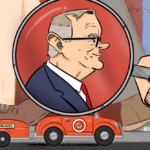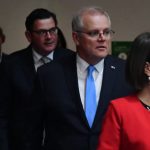Silencing democracy – the media and Duncan Storrar
A group of disabled peoples organisations, not for profits, community leaders, Human Rights lawyers, unions and commentators on civic participation have issued a Statement of Concern about the media treatment of Duncan Storrar after asking a question as an audience member on the ABC television program Q&A. Craig Wallace, President of People with Disability Australia, explains.
I never thought I would be sitting here in Australia having to seriously point out that it is the right of a voter to ask questions and the duty of elected leaders to step up and protect our rights to ask them.
Yet here we are. Today a group of more than thirty disabled peoples organisations, not for profits, community leaders, Human Rights lawyers, unions and commentators on civic participation have united to issue an unprecedented National Civil Society Statement of Concern about the media treatment of Duncan Storrar.
On the ABC’s Q&A program on Monday 9 May 2016 Mr Storrar asked a question about the Budget, tax cuts, and income inequality. In speaking to topical current affairs matters he identified as a person with disability who is struggling to support a family while experiencing a low income. Mr Storrar engaged in civil discussion inside the program format and made a valid response that all people pay tax including via taxes applied to petrol, goods and services.
Since asking that question Mr Storrar has been subject to an onslaught of personal investigations, attacks, intrusion into his privacy, family and ridicule in a range of publications, including The Australian and The Herald Sun newspapers. The patent disregard of the impact of this reporting on an individual is an abuse of power. The manner of its happening, including the speed of his brushes with the law finding their way into the Herald Sun, begs other questions. It’s lack of proportion requires a response from people in a position to give one.
Looked at with more than a week’s perspective the treatment of Duncan Storrar is unprecedented. Never before have sections of the Australian media and the elite gone so hard for someone who is clearly a bystander in the political process. As far as we know he’s not running for office, he’s not a lobbyist, nor has he claimed to be a saint. He’s no tall poppy.
He asked a question of an elected official and a panellist on a program where you expect to get tricky questions – it’s not called “Q&A” by accident.
You have to look to countries like Russia, Iran or China to find examples of simple public comment meeting with public shaming. Even China has had (rare) periods of tolerance for citizens who speak up about corruption, at least at the local official’s level.
As this has played out across the week what was just as alarming is the pin drop silence from most politicians. Our elected leaders have been slow to come out and defend Mr Storrar who is surely doing exactly what responsible and engaged voters are meant to do – be an engaged voter in an informed democracy. Surely protecting those rights is, above all, what we elect them to do?
Possibly this is partly because Duncan has had family troubles and a past.
Meet your voters and political masters in the outer suburbs and low income housing blocks of just about any Australian city. Most of us didn’t grow up in tranquil gentility sauntering though life as if it were a Marchant Ivory film.
When our families cracked apart the result was less Brady Bunch and more the chopper scene in Apoclaypse Now. All that’s left are crooked lines and broken strands.
I spent a few of my formative years in one such suburb called Claymore and have known many Duncans. A few of them had rough edges, but bigger hearts and far clearer motives than the thin-lipped po-faced professionals who click through polished halls here in the Canberra I call home these days.
Fraught, difficult lives of poverty and fractured families are the default for many Australians outside the inner city café fringes of Melbourne, Canberra and Sydney.
The Aussies in Poor Man’s Orange didn’t disappear, they got moved off to large housing estates in the outer suburbs. Indeed many of them are loyal readers of the tabloids that skewered Duncan. Yet you’d think News Limited, the ABC and our politicians alike had only just discovered this Australia with the collective surprise of David Attenborough stumbling onto some rare lost species of butterfly.
Mr Storrar’s disability is also relevant. His journey from hero to villain in a week mirrors the way we treat people every day – we applaud people for doing ordinary things (like asking a question on a program where you ask questions), offer them charity they haven’t asked for and then paint them as bludgers for accepting it. It’s a stacked deck of cards.
Neither left or right did Duncan many favours last week as they grabbed him for their agendas.
One of these gaining ground in pockets of the hard right is that somehow being on a low income diminishes your rights to suffrage. Backflipping the American revolutionary catchcry of no taxation without representation, we now have “no participation without taxation”.
It’s not quite as catchy and given that suffrage has been on a steady march away from property rights since the 1860’s it’s a strange argument for these times. It’s also a dangerous one if you’re a liberal democrat right now – you don’t have to look far to see what happens when a disenfranchised insurgency feels that it has no way to make a case. The populism of Sanders, Corbyn and Trump are all results of that phenomenon.
A safety valve here has been the right for people to tell it like it is and be heard by power including through organisations like mine. Australia was also an early adopter of talkback radio. We’re good at writing letters too and the runaway success of social media has given people new platforms.
We’re used of speaking our minds here, yet the treatment of Mr Storrar sets a dangerous backwards precedent.
Any person who writes a letter, takes part in a newspaper ‘vox pop’ or rings a talk back radio station with views now has a reasonable basis for feeling under threat of retribution through intrusive and personalised attacks. How did we come to this? And how do we pull back from the brink?
First we need leadership. That’s why we’ve broken the silence and called on the Prime Minister and the Opposition leader to affirm the right of all people to take part in public debate and to express diverse opinions in the public square in a peaceful way free from bullying, personal intrusion, harassment or intimidation through todays Statement of Concern. That should happen now, during the election. It should be unreserved. Op eds like this should be being written by them, not me.
We also call on the new Human Rights Commissioner to begin a dialogue on responsible measures, such as an Australian Bill of Rights, to safeguard the right of members of the community and civil society organisations to engage in civil discourse and public debate free from gags and intimidation. We’ve heard a lot about this traditional rights agenda – well, nothing’s more traditional than the freedom of battlers to speak their minds.
But most of all we ask the media to look back on a sorry fortnight and affirm that the ability of individuals to speak in the public arena free from interference, bullying and intimidation is entwined with their own freedom to publish.
Craig Wallace is a policy manager and activist. His articles have been published in The Australian Financial Review, The Guardian, The Australian, ABC Ramp Up, Crikey and The Canberra Times. He tweets @CraigWtweets.













Cheryl McDonnell
May 21, 2016 at 11:54 am
Will Government affirm our right to ask questions?
It is imperative our government steps up and holds all media outlets to account for bullying, humiliation, and intimidation of the people of Australia when the people are exercising their human rights to question government policy and legislation. Good government can always face close scrutiny and should not fear the questions of ordinary people. It is fair and reasonable to expect government officials to answer reasonable questions. Good government does not fear questions.